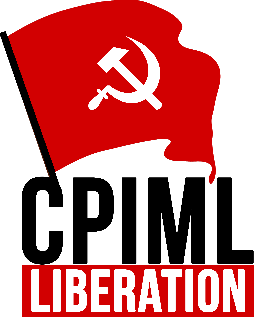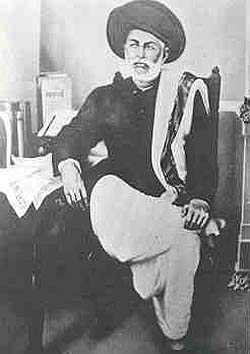Related Research Articles

The Communist Party of India (Marxist) (abbreviated as CPI(M)) is a communist political party in India. It is the largest communist party in India in terms of membership and electoral seats, and one of the six national parties of India. The party was founded through a splitting from the Communist Party of India in 1964 and it quickly became the dominant faction.

Jyotirao Phule, also known as Jyotiba Phule, was an Indian social activist, businessman, anti-caste social reformer and writer from Maharashtra.

The Communist Party of India (Marxist–Leninist) Liberation is a communist political party in India. The party is represented in Bihar and Jharkhand Legislative Assemblies. Since 2023, the party is also a member of the INDIA electoral alliance. In Bihar, the party has significant base amongst the Extremely Backward Castes and the Schedule Castes. It was successful in mobilising Upper Backward Caste groups such as Koeris in some districts of central Bihar, prior to the rise of Lalu Prasad Yadav. The party faced existential crisis when a large section of its Koeri and Yadav support base defected to Rashtriya Janata Dal in 1990s. However, the ideological commitment of its cadre protected it from disintegration. It staged a comeback in politics after winning twelve seats in Bihar Legislative Assembly in 2020 and by sending two of its members to Lok Sabha in 2024 Indian general elections.

The Republican Party of India (Athawale) is a political party in India. The party is a splinter group of the Republican Party of India and has its roots in the Scheduled Castes Federation led by B. R. Ambedkar. The president of the party is Ramdas Athavale.
Politics in South India is typically dominated by regional parties than by the larger national political parties such as the Indian National Congress (INC), Communist Party of India (Marxist) or Bharatiya Janata Party (BJP). However, both the BJP, INC and CPI(M) have had some success in forging alliances with regional parties. Unlike in North India, where religion plays an important role in driving local politics, South India's political issues of contention are mainly language and ethnicity.

Ramdas Bandu Athawale is an Indian politician, social activist and trade unionist from Maharashtra. He is the president of the Republican Party of India (A), a splinter group of the Republican Party of India and has its roots in the Scheduled Castes Federation led by Dr. B. R. Ambedkar since 1999. Currently, he is the Minister of State in the Ministry of Social Justice and Empowerment, Government of India since 2016 and represents Maharashtra in Rajya Sabha, the upper house of India's Parliament since 2014. Previously, he was Lok Sabha MP from Pandharpur from 1999 to 2009 and from Mumbai North Central Lok Sabha constituency from 1998 to 1999. He was also Cabinet minister of Maharashtra from 1990 to 1995 and a member of the Maharashtra Legislative Council from 1990 to 1996.
Ram Chandra Dome is an Indian politician and a Politburo member of the Communist Party of India (Marxist). A doctor by profession, he was elected to the Lok Sabha for seven consecutive terms. He is the first member from the scheduled castes to be inducted in the politburo. He has also been serving as the national general secretary of Dalit Shoshan Mukti Mancha, CPI(M)'s frontal organisation for backward castes, since 2018.

Socialism in India is a political movement founded early in the 20th century, as a part of the broader movement to gain Indian independence from colonial rule. The movement grew quickly in popularity as it espoused the causes of India's farmers and labourers against the zamindars, the princely class and the landed gentry. After independence and until the early 1990s, socialism shaped some economic and social policies of the Indian government, although they mostly followed the principles of dirigisme. After this period, India moved towards a more market-based economy, though, India is officially declared a socialist state as per the constitution.

Satyashodhak Samaj was a social reform society founded by Jyotiba Phule in Pune, Maharashtra, on 24 September 1873. The society endeavoured to mitigate the distress and sufferings of Dalits and women. It espoused a mission of education and increased social rights and political access for underprivileged groups, focused especially on women, peasants, and Dalits, in Maharashtra. Jyotirao's wife Savitribai was the head of women's section of the society. The Samaj disbanded during the 1930s as leaders left to join the Indian National Congress party.

Communism in India has existed as a social or political ideology as well as a political movement since 1920's. In its early years, communist ideology was harshly suppressed through legal prohibitions and criminal prosecutions. Eventually, communist parties became ensconced in national party politics, sprouting several political offshoots.
Keshavrao Marutirao Jedhe was an Indian independence activist and politician from Pune. He served as a leading figure in the Indian National Congress, and in the Samyukta Maharashtra movement during the independence. The famous Swargate chowk in Pune is named after him.
The Republican Left Democratic Front (RiDaLoS) was a coalition of political parties in the Indian state of Maharashtra formed before the 2009 Maharashtra state assembly elections, in Maharashtra. The alliance was forged between 14 political parties and many other NGOs and non political groups as well as students organisations in Maharashtra Republican Left Democratic Front Popularly known as RIDALOS as an alternative to the existing coalitions in the state.
The Dalit Panthers was a social organisation that sought to combat caste discrimination. It was led by a group of Mahar writers and poets, including Raja Dhale, Namdeo Dhasal, and J. V. Pawar in some time between the second and the third semester of 1972. It was founded as a response to the growing discontent among the Dalit youth during the 25th Independence Day celebrations. Inspired by the Black Panther movement in the United States, poet-writers J V Pawar and Namdeo Dhasal founded the Dalit Panthers, urging a boycott of the Independence Day revelry, terming it a 'Black Independence Day'. The movement's heyday lasted from the 1970s through the 1980s, and it was later joined by many Dalit-Buddhist activists.
Although a parliamentary democracy, Indian politics has increasingly become dynastic, possibly due to the absence of a party organization, independent civil society associations that mobilize support for the party, and centralized financing of elections. Family members have also led the Congress party for most of the period since 1978 when Indira Gandhi floated the then Congress(I) faction of the party. It also is fairly common in many political parties in Maharashtra. The dynastic phenomenon is seen from national level down to district level and even village level.The three-tier structure of Panchayati Raj established in the 1960s also helped to create and consolidate the dynastic phenomenon in rural areas. Apart from government, political families also control cooperative institutions, mainly cooperative sugar factories, district cooperative banks in the state, and since the 1980s private for profit colleges. The ruling Bharatiya Janata Party also features several senior leaders who are dynasts. In Maharashtra, the NCP has particularly high level of dynasticism.

Uttamrao Laxmanrao Patil alias Nanasaheb was an Indian politician and leader of the Bharatiya Janata Party. He was elected to Second Lok Sabha from 1957 to 1962 from Dhulia Lok Sabha Constituency of erstwhile Bombay State as a candidate of Bharatiya Jana Sangh. He was elected to Ninth Lok Sabha from 1989 to 1991 from Erandol Lok Sabha Constituency of Maharashtra as a candidate of Bharatiya Janata Party. He was also a Member of Maharashtra Legislative Council during 1954-55 and from 1966 to 1978. He was the Leader of Opposition of the council from 1966 to 1978. He was also a member of Maharashtra Legislative Assembly from 1978 to 1980. He was state cabinet minister from 1978 to 1980 in the Progressive Democratic alliance Government of Maharashtra state led by Sharad Pawar. He held revenue portfolio. He was an advocate by profession. Shri Patil authored two books. He was also the founder editor of Sudarshan weekly. He died on 18 November 2001 at Mumbai.
Madhavrao Khanderao Bagal, also called Bhai Madhavrao Bagal, was a noted writer, artist, journalist, social reformer, political activist, orator and freedom fighter from Kolhapur.

On 17 June 1979 a by-election was held in for the Nagapattinam seat in the Lok Sabha. The by-election was called after the murder of the incumbent Communist Party of India parliamentarian S.G. Murugaiyan, one of three prominent communist leaders killed in the state of Tamil Nadu in 1979. The Nagapattinam constituency was reserved for Scheduled Castes.

The Vanchit Bahujan Aaghadi is an Indian political party founded by Prakash Ambedkar on 20 March 2018. The party is primarily based in Maharashtra in India. Vanchit Bahujan Aaghadi follows Phule-Ambedkarite ideology.
Dinkarrao Javalkar was a social activist and a leader of non-Brahmin movement in Bombay Presidency. He, along with Keshavrao Jedhe, first emerged as a young leader of non-Brahmin movement in Pune, and later gained state-wide reputation for his scathing critic of Bal Gangadhar Tilak and Vishnushastri Chiplunkar in his book Deshache Dushman. Started as a principled follower of Mahatma Phule, he further turned more towards communism and worked to bring communist principles together with teachings of Satyashodhak Samaj.
References
- ↑ Rege, Sharmila (2006). Writing Caste, Writing Gender: Reading Dalit Women's Testimonios. Zubaan. p. 7. ISBN 9788189013011.
- ↑ Patil, Sharad. Diagnosis of Left's Debacle Still Undetected , Mainstream 30 July 2009
- ↑ Antithesis of Caste and Class – An Orthodox Marxist Hypothesis
- 1 2 3 Omvedt, Gail. Reinventing Revolution: New Social Movements and the Socialist Tradition in India. Socialism and social movements . Armonk, N.Y.: M.E. Sharpe, 1993. pp. 67–68, 95
- ↑ Counterview. How this Satyashodhak Marxist sought to trigger 'broader' Ambekarite alternative
- ↑ Dhawale, Ashok (10 May 2009). "What Lok Sabha Results Show". People's Democracy. Archived from the original on 29 June 2009.
- ↑ Menon, Meena. Republican Left Democratic Front launched; to contest in Maharashtra , The Hindu 25 August 2009
- ↑ Bhupta, Malini. Diversity in unity , India Today 24 September 2009